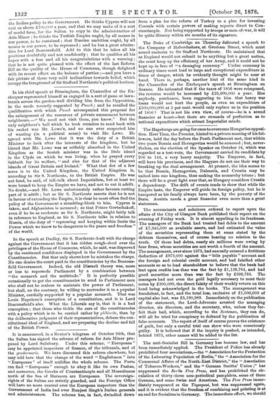In his chief speech at Birmingham, the Chancellor of the
Ex- chequer represented himself as engaged in a sort of game at lawn- tennis across the garden-wall dividing him from the Opposition, in the mode recently suggested by Punch ; and he recalled the qualification with which Punch accompanied this proposal for the enlargement of the resources of private amusement between neighbours,—" We need not visit them, you know." But the only neighbour's ball which he took occasion to send back with his racket was Mr. Lowe's, and no one ever suspected him of wanting (in a political sense) to visit Mr. Lowe. He agreed with Mr. Lowe that it was the duty of a British Minister to look after the interests of the kingdom, but he hinted that Mr. Lowe was as selfishly absorbed in the United Kingdom as the Scotch minister was in the little island in the Clyde on which he was living, when he prayed every Sabbath for its welfare, " and also for that of the adjacent islands of Great Britain and Ireland." What that dot of a few acres is to the United Kingdom, the United Kingdom is, according to Sir S. Northcote, to the British Empire. He was not fond, he said, of tall-talk about Imperialism, but at least we were bound to keep the Empire we have, and not to cut it adrift. No doubt,—and Mr. Lowe unfortunately rather favours cutting part of it adrift ; but as Sir S. Northcote asserts that he is not in favour of extending the Empire, it is clear he must often find the policy of the Government a stumbling-block to him. Cyprus is taken, and Afghanistan is menaced ; so that Prince Gortschakoff, even if he be as moderate as Sir S. Northcote, might fairly talk in reference to England, as Sir S. Northcote talks in relation to Russia, of the duty of " repressing and keeping within limits the Power which we know to be dangerous to the peace and freedom " of the world.


































 Previous page
Previous page